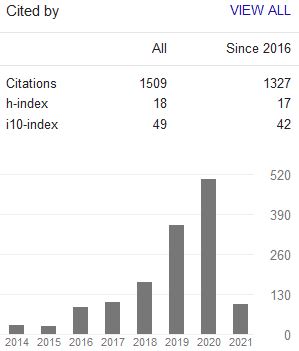ISLAM AS A CULTURAL CAPITAL IN INDONESIA AND THE MALAY WORLD: A Convergence of Islamic Studies, Social Sciences and Humanities
Abstract
Keywords
Full Text:
PDFReferences
Abu-Rabi’, Ibrahim M. The Contemporary Arab Reader on Political Islam. London and New York: Pluto Press, 2010.
Antes, Peter, Armin W. Geertz, and Randi R. Warne (eds), New Approaches to the Study of Religion, Volume 1, Regional, Critical and Historical Approaches. Berlin, New York: Walter de Gruyter, 2004.
Aqdhiwijaya, Eddy, et.al. Pendidikan Interreligius: Non-Formal. Surakarta: CDCC, 2016.
Auda, Jasser. Maqasid al-Shari’ah as Philosophy of Islamic Law: A Systems Approach. London and Washington: The International Institute of Islamic Thought, 2008.
Bano, Masooda and Keiko Sakurai (eds). Shaping Global Islamic Discourses: The Role of al-Azhar, al-Medina and al-Mustafa. London: Edinburg University Press in association with The Aga Khan University, (International) in the United Kingdom, Institute for the Study of Muslim Civilizations, 2015.
Direktorat Pembelajaran, Direktorat Jenderal Pembelajaran dan Kemahasiswaan, Kementrian Riset, Teknologi, dan Pendidikan Tinggi. Memandang Revolusi Industri & Dialog Pendidikan Karakter di Perguruan Tinggi. Jakarta: Direktorat Pembelajaran, Direktorat Jenderal Pembelajaran dan Kemahasiswaan, Kementrian Riset, Teknologi, dan Pendidikan Tinggi, 2017,
Hernes, Gudmund. “Preface,” World Social Science Report, 2010: Knowledge Divides. Paris: United Nations Educational, Scientific and Cultural Organization and International Social Science Council, 2010.
Hodgson, Marshall G.S. The Venture of Islam: Conscience and History in World Civilization. Chicago dan London: The University of Chicago Press, 1974.
Kersten, Carool. Islam in Indonesia: The Contests for Society, Ideas and Values. London, Palgrave Macmillan, 2015.
Kusuma, Mirza Tirta (ed.). Ketika Makkah Menjadi Seperti Las Vegas: Agama, Politik, dan Ideologi. Jakarta: Gramedia Pustaka Utama, 2014.
Listia, Purwono Nugroho Adhi, and Sartana. Pendidikan Interreligius: Gagasan Dasar dan Modul Pelaksanaan, Buku Suplemen Pendidikan Agama untuk SMA. Surakarta: CDCC, Religions for Peace, KAICIID Dialog Center, 2016.
Nurcholish Madjid, Khazanah Intelektual Islam. Jakarta: Bulan Bintang, 1984.
----------. Islam: Doktrin dan Peradaban. Sebuah Telaah Kritis tentang Masalah Keimanan, Kemanusiaan, dan Kemoderenan. Jakarta: Paramadina, 1992.
---------. Islam: Agama Peradaban. Membangun Makna dan Relevansi Doktrin Islam Dalam Sejarah. Jakarta: Paramadina, 1995.
Markham, Ian and Ibrahim M. Abu Rabi’ (eds). 11 September: Religious Perspectives on the Causes and Consequences. Oxford: Oneworld Publications, 2002.
Meijer, Roel (ed.). Global Salafism: Islam’s New Religious Movement. London: Hurst & Company, 2009.
Saeed, Abdullah. Interpreting the Qur’an: Towards a Contemporary Approach. London and New York: Routledge, 2006.
Safi, Omid (ed.). Progressive Muslims: On Justice, Gender and Pluralism. Oxford: Oneworld Publications, 2005.
Shahrur, Muhammad. Nahw Ushulin Jadidah li al-Fiqh al-Islamiy: Fiqh al-Mar’ah (al-Wasiyyah-al-Irth-al-Qawwamah al-Ta’addudiyyah al-Libas). Damascus, Syria: al-Ahali li al-Tiba‘ah wa al-Nasyr wa al-Tauzi, 2000.
Suhadi, Linda Bustan, Listia, Purwono Nugroho Adhi. Pendidikan Interreligius: Gagasan Dasar dan Modul Pelaksanaan. Surakarta: CDCC, Religions for Peace, KAICIID Dialog Centre, 2016.
Sumartana, Th. Soal-Soal Teologis dalam Pertemuan Antar Agama. Yogyakarta: Interfidei, 2015.
Tabrani, Primadi. Belajar dari Sejarah dan Lingkungan. Bandung: Penerbit ITB, 2011.
Waugh, Early H and Frederick M. Denny (eds). The Shaping of An American Islamic Discourse: A Memorial to Fazlur Rahman. Atlanta, Georgia: Scholars Press, 1998.
United Nations Educational, Scientific and Cultural Organization and International Social Science Council. World Social Science Report, 2010: Knowledge Divides. Paris: United Nations Educational, Scientific and Cultural Organization and International Social Science Council, 2010.
DOI: 10.15642/JIIS.2017.11.2.307-328
Refbacks
- There are currently no refbacks.
Indexed by:
Journal of Indonesian Islam (ISSN 1978-6301 and E-ISSN 2355-6994) is published by the Postgraduate Program (PPs) and the Institute for the Study of Religion and Society (LSAS), State Islamic University (UIN) of Sunan Ampel Surabaya.
Journal of Indonesian Islam by http://jiis.uinsby.ac.id/index.php/JIIs/index is licensed under a Creative Commons Attribution-ShareAlike 4.0 International License.
Copyright ©2020 State Islamic University (UIN) of Sunan Ampel Surabaya. Powered by Public Knowledge Project OJS.







